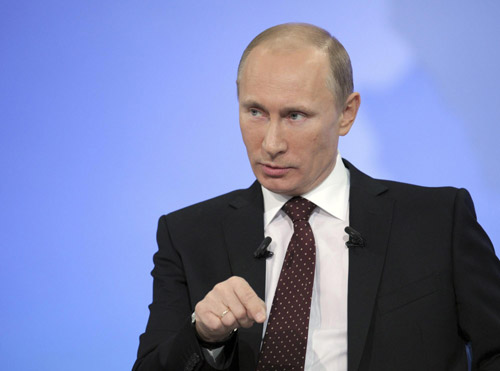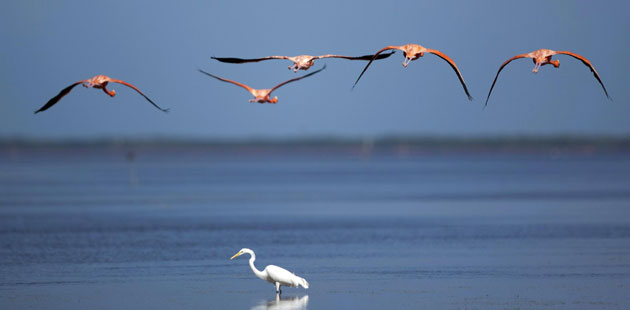Putin defends fairness of election
Updated: 2011-12-16 09:12
(Xinhua)
|
|||||||||
 |
|
Russian Prime Minister Vladimir Putin gestures during a televised questions and answers session in Moscow December 15, 2011. [Photo/Agencies] |
MOSCOW - Russian Prime Minister Vladimir Putin defended fairness of the state Duma, or the lower house of parliament election and vowed to develop the country's economy in his annual televised call-in on Thursday, the 10th in his political life.
During the four-and-half-hour live show, Putin answered 88 questions ranging from elections to domestic and international affairs.
A large proportion of the questions were about the recent parliamentary elections on Dec. 4, when the United Russia, whose leader is Putin and whose candidates list was led by President Dmitry Medvedev, gained an absolute majority in the new State Duma, or the lower house of parliament.
Putin said he has been "fed up with these questions" and stressed the results of the polls reflected the views of Russian voters.
"If you are saying that our elections were objective and fair, in my opinion, I have already said publicly that, beyond any doubt, the results of these elections reflect the actual line-up of forces in the country, as well as the fact that the ruling force -- United Russia -- has lost certain positions," Putin said.
He added that he had ordered web-cameras be installed at all polling stations during next March's presidential election, in which Putin is widely expected to win.
In the show, Putin confirmed again that Medvedev would become prime minister of Russia after next March's presidential election.
Putin lauded the ruling party's victory in parliamentary elections, saying that the victory was sufficient for appointing Medvedev as prime minister.
With regards to the mass protests against the alleged vote fraud, Putin said he did not see anything abnormal in the opposition's protests, but noted that protests by opposition parties were aimed at next March's election.
"It is obvious to me that the attacks on the latest election are secondary; their primary goal is the next election, the Russian presidential election," Putin said.
The prime minister also said that his presidency bid was aimed at strengthening the Kremlin's grip of power. "Otherwise, the terrorists will raise their heads," Putin noted.
He also proposed direct elections of regional leaders, saying parties who win regional elections could propose lists of candidates to the president.
Currently, the heads of Russian regions are nominated by the president and approved by the regional legislature.
In addition, Putin especially pointed out that certain people in the opposition groups have been used and paid by foreign states to weaken Russia.
"There are some people in the opposition groups who have Russian passports but work for the interests of foreign states," Putin said.
Still, he promised to try to bridge the differences with the hardcore opposition in case he would be elected as president of Russia in March 2012. The prime minister also said that he would leave office if he loses supports to his policy.
Responded to US Senator John McCain who wrote on his twitter account that the Arab Spring was coming to Russia, Putin said he considered that the warning was an attack against entire Russia but not against him personally.
His remarks elicited applause from the audience consisted mostly of leading Russian professionals in various spheres.
"Russia won't yield to the US attempts to rule the world unrestrictedly," Putin said, adding that Russia has "a lot of potential allies" in the world attracted by its independent international policy.
"We would like to be allies with the US too, but Washington needs no allies, it needs vassals. The suspicion from the past prevents us to develop the relations with the West, " Putin said.
Meanwhile, Putin stressed that Moscow is willing to continue developing its relations with Washington.
Speaking about Russian economy, Putin said it has been stable and healthy. He warns about the looming credit crunch in the United States and the debt crisis in the European Union could lead to recession that would also hinder Russia's economic development.
He said Russia's gross domestic product in 2011 would increase 4.2-4.5 percent and the country's industrial output would rise 5.1 percent. He also forecast Russia's real wages would grow 2.9 percent.
"Inflation this year will be about 6 percent, we are already drawing level with the European countries. We need to sustain this downward trend," Putin said.
The prime minister also praised the "real integration" among Russia, Belarus and Kazakhstan and hinted a possible creation of the sub-national institutions in order to boost competitiveness of the Eurasian Economic Union.
The Eurasian Economic Union was initiated by Putin in October, which envisages the Russia-Belarus-Kazakhstan Customs Union should gradually transform itself into the Eurasian Economic Union, which is expected to become a bridge between Europe and the Asia-Pacific region.
"Although we have not reached the (European Union's) level of integration so far, we are moving toward the Eurasian Economic Union to create the common currency and joint economic development, " Putin said.
Besides, the prime minister also answered questions related to social services and social protection, housing, public utilities and jobs and salaries.
Putin avoided direct answer to the questions about whether he has succeeded in fighting corruption in his government and across Russia. He repeated that the authorities would fight that evil " tough and consistently" but rejected the government would hold any special anti-corruption campaign.











